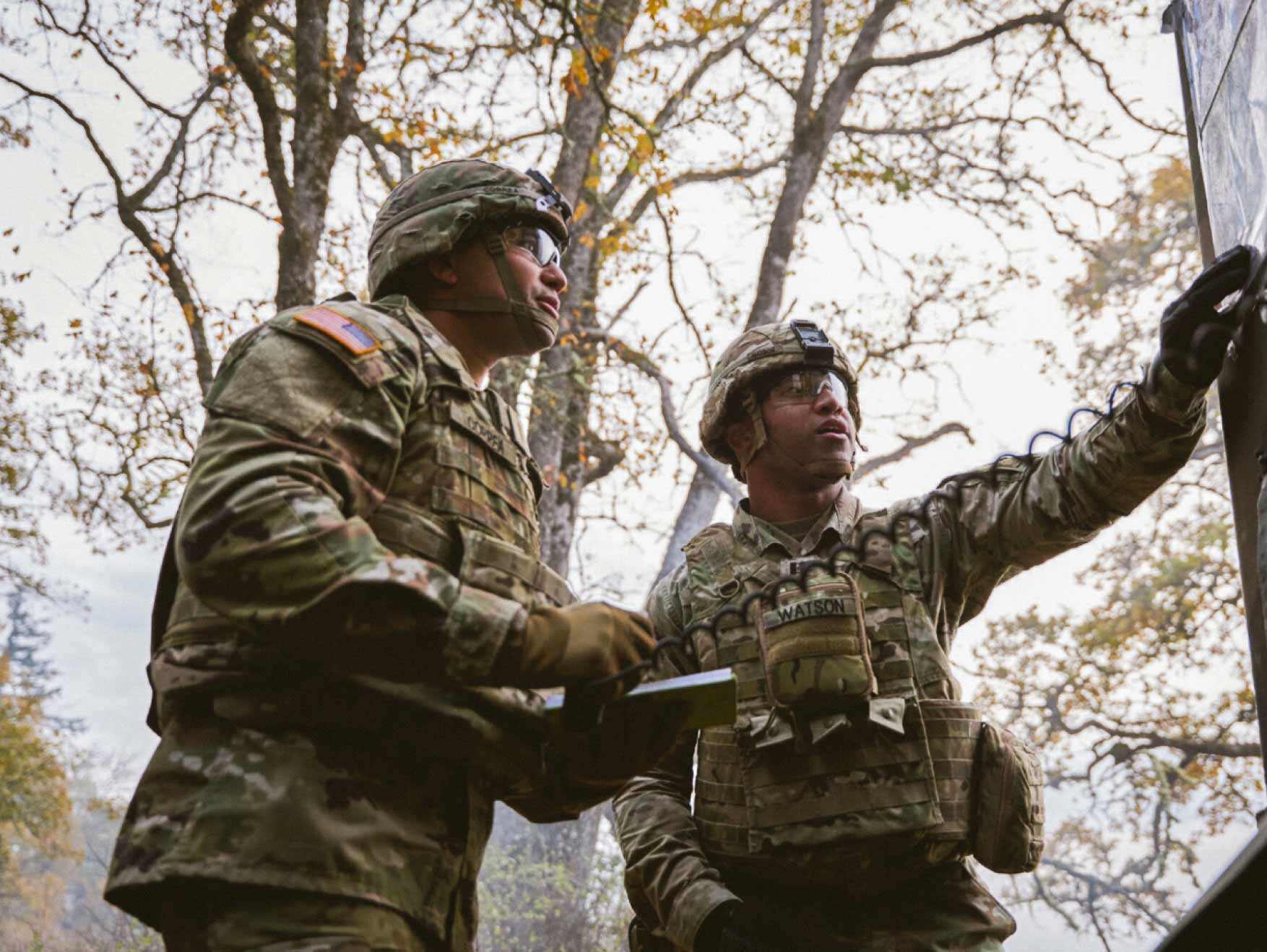Requirements to Join
Find out what it takes to serve.
Be part of something greater than yourself while becoming stronger by joining the U.S. Army.

Requirements to join the Army.
The requirements to join are different based on how you choose to serve—as an enlisted Soldier or Army Officer. We’re here to help you navigate the requirements, no matter which path you choose.
-
Enlisted
-
Officer
Perform important day-to-day operations and ensure the success of your unit’s mission. Requirements to join as an enlisted Soldier include:
-
Be between 17 and 35 years old
-
Be medically and physically fit
-
Be a U.S. citizen or permanent resident with a valid Green Card
-
Have a high school diploma or equivalent
-
Earn a minimum score on the Army’s entrance test
You’re
You’re
more than
more than
capable.
capable.
What to know about joining the Army.
Make sure you’re prepared to take the next step by considering some of the common questions other Soldiers had before they joined. You can always talk to a recruiter if you have any additional questions.

Age
Can I join the Army if I’m older than the maximum age requirement?
Can I join the Army if I’m older than the maximum age requirement?
The maximum age to join the Army as an enlisted Soldier is 35, while Officers must accept their commission before age 31. However, the Army can lift some restrictions based on the need for certain roles to be filled. It’s possible to receive an age waiver, especially if you have prior military service. Talk to your recruiter to learn more.
Medical & Physical
Can I join if I have a medical disqualification?
Can I join if I have a medical disqualification?
You can still join with a medical disqualification as long as you get a medical waiver, which is issued on a case-by-case basis.
Are there any restrictions around tattoos?
Are there any restrictions around tattoos?
You can have tattoos almost anywhere on your body, with a few exceptions. There are some limits to the size and number of tattoos on highly visible areas like the hands, neck, and behind the ears. Tattoos in the mouth, ears, or on the eyelids are not allowed. It’s possible to get a waiver in some instances. However, tattoos anywhere on your body that are extremist, racist, sexist, or otherwise indecent aren’t allowed, no exceptions. See all tattoo requirements in the hair and appearance guidelines.
Can I still join if I have asthma, poor vision, or poor hearing?
Can I still join if I have asthma, poor vision, or poor hearing?
Asthma will only prevent you from joining if you were diagnosed with it after your 13th birthday. Hearing, vision, and asthma qualifications are usually determined by medical exams. You can still request an asthma, vision, or hearing loss waiver if a doctor denies your application.
Can I join if I have ADHD?
Can I join if I have ADHD?
Yes. It will only prevent you from joining the Army if you’ve been treated with ADD/ADHD medication within the last year, or if you display obvious signs of the condition.
Will my height or weight prevent me from joining?
Will my height or weight prevent me from joining?
Height and weight restrictions vary by age and gender. Check the height and weight chart to see if you’re within the requirements to join.
Men (Ages 17 – 20)
Height: 58 – 80 in.
Weight: 234 lb max
Women (Ages 17 – 20)
Height: 58 – 80 in.
Weight: 119 – 227 lb.
If you enlist to become a Soldier and don’t meet the physical requirements at MEPS, you may be eligible for the fitness track of a program called the Future Soldier Preparatory Course. Over 90 days, Army health and fitness experts will help you meet the required body fat composition before you start Basic Training. Talk to a recruiter about program details and if it’s an option for you.
Are there any physical requirements to join?
Are there any physical requirements to join?
For both the enlisted Soldier and commissioned Officer paths, you’ll need to meet the height and weight requirements for your age and gender before joining. A recruiter will work with you after you join to meet the physical requirements of your chosen Military Occupational Specialty (MOS) or Army job.
- The Army Combat Fitness Test (ACFT) evaluates your physical and mental abilities, starting at Basic Training for enlisted Soldiers and during initial training for those commissioning as Officers
- Everyone will need to pass the ACFT during training and again several times a year for every year of service. Scores are recorded twice a year for active duty Soldiers in the Army, or once a year for members of the Army Reserve and Army National Guard. The Army will be there to support your growth with resources during every step of the evaluation process to ensure your success
Education
Can I no longer join if I score too low on the ASVAB placement exam?
Can I no longer join if I score too low on the ASVAB placement exam?
Yes, the Army understands that some circumstances can impact your ability to score well. A waiver can be requested in those situations.
If you want to improve your test score and have a minimum score of 21, the academic track of the Future Soldier Preparatory Course may be an option for you. This 90-day program provides training on all the subjects covered on the ASVAB, as well as opportunities to retake the test. Find out more about the ASVAB entrance test and work with a recruiter to see if this program is right for you.
Values & Character
If I have a previous felony or a conviction, can I still join?
If I have a previous felony or a conviction, can I still join?
Generally, felons and those with several convictions can’t join the Army, but waivers are available in some cases. The offenses and moral behavior-related issues that cannot be waived include:
- If you are under civil restraint, including parole, confinement, or probation
- If you are subject to civil court conviction or adverse disposition for more than one serious offense, or serious offenses with three or more other offenses (apart from traffic)
- If you are found trafficking, selling, or distributing narcotics, including marijuana
- If you have three or more convictions related to driving while intoxicated, drugged, or impaired in the past five years before joining
- If you are convicted for five or more misdemeanors
- If you are unable to pass a drug or alcohol test, or if you have current charges pending against you
Citizenship
What is the U.S. citizenship requirement to join the Army?
What is the U.S. citizenship requirement to join the Army?
Although the Army wants people from all different backgrounds and experiences, all candidates must be a U.S. citizen or permanent resident with a valid Green Card (officially known as a I-551 Permanent Resident Card).
If you already have a Green Card, serving in the Army can reduce the residency requirement for becoming a U.S. citizen to as little as one day instead of five years. The naturalization process for citizenship can begin as soon as your first day of Basic Training.
Waivers
What can I do if I don’t meet the eligibility requirements to join?
What can I do if I don’t meet the eligibility requirements to join?
The Army has a waiver process that you can take advantage of to prove you overcame a disqualifying issue that would otherwise prevent you from joining the Army. After submitting a waiver, a review takes place to make sure you can join. If your waiver is denied, you can also look into pursuing a civilian career within the Army.
Height & Weight Requirement Chart
See what it takes to join.
Take the Soldier Prep Quiz to find out how you can become part of the greatest team in the world.

Other aspects of joining the Army
Take the first step.
Find out more about becoming a Soldier and if a career in the Army is right for you.